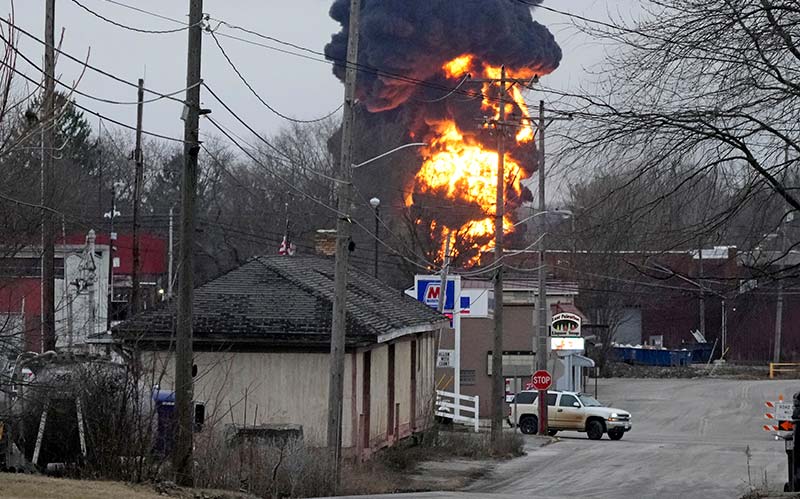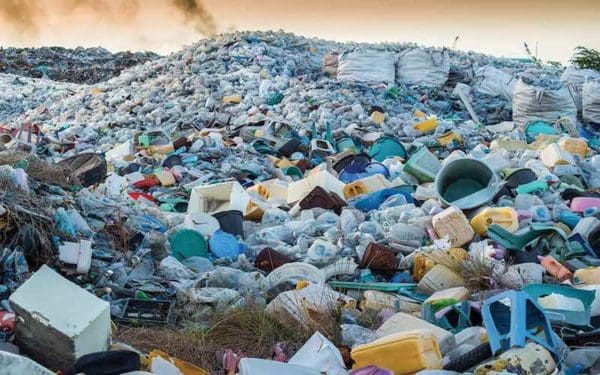
A black plume and fireball rise over East Palestine, Ohio, as a result of a controlled detonation of a portion of the derailed Norfolk Southern trains Monday, Feb. 6, 2023. (AP Photo/Gene J. Puskar)
Last month, the Environmental Protection Agency (EPA) administrator Michael Regan and Ohio Governor Mike DeWine choked down a glass of tap water as part of a photo op. The goal? To convince residents of East Palestine, Ohio, that town water was safe after a train derailed, spilling its cargo of toxic chemicals.
Their act of bravado was unconvincing then and even more so now. Weeks after the Norfolk Southern train careened off its tracks, the community of nearly 5,000 has been devastated in every possible way.
In the days immediately following the decision to allow a “controlled” burn of the train’s cargo – which included more than 100,000 gallons of hazardous, petroleum-based chemicals – residents suffered headaches, rashes, sore throats, nausea, and burning eyes. An estimated 40,000 dead fish surfaced in nearby streams. Farmers in the area reported sick chickens laying purple eggs. One beekeeper said half his bee colony had collapsed.
Now, residents have even more worries. The EPA has tracked elevated levels of at least nine chemicals in the area. Those chemicals have been associated with severe health problems, including lymphoma, leukemia, miscarriages, and birth defects. Farmers worry about the safety of crops. Homeowners worry about their home values.
While surely not top of mind for the residents of East Palestine, the reality is that the entire debacle is a sad consequence of the fossil fuel industry’s deadly plastics push. The volatile chemicals on that train are the building blocks of polluting plastic products, and they were headed for a nearby manufacturing plant. In a high-stakes bid to keep itself viable, Big Oil has ramped up production of plastic – and if we’re not vigilant, we will all pay the price of poor health outcomes and ravaged environments.
Banking On Plastics for the Bottom Line
Plastic and fossil fuels are intimately wedded in a filthy marriage of convenience.
When fossil fuel companies realized that clean energy sources like offshore wind, electric cars, and solar energy were gaining traction (threatening their multi-billion-dollar profits), they sought other ways to keep the dollars flowing in. Their solution? Plastics. That is, plastic bottles, plastic food wrappers, plastic container caps, plastic grocery bags, plastic pipes for houses, plastic shower curtains, and on and on.
If they could keep us hooked on plastic, they calculated, they could keep making money, even in an era when carbon pollution from burning fossil fuels is clearly changing our climate. By jumping into the plastic business, they can still peddle polluting oil and gas even as demand for those fuels in heating, electricity, and transportation falls off. And that is exactly what they’ve been doing with great success. According to the International Energy Agency, by mid-century, nearly half of all oil demand growth will be driven by plastics.
The Making of Plastics Is a Filthy Process from Beginning to End
In short, Big Oil has become Big Plastic. And they are bent on propping up a paradigm of fossil fuel reliance that has long outlived its prime.
That’s because there’s no getting around the fact that fossil fuels pollute in whatever form you find them. To begin with, the extraction and transportation of fossil fuels emit a lot of carbon. Then, refining these fossil fuels into plastic emits even more. Refinery plants process fossil fuels into chemicals like ethane and propane. Then, in a process known as “cracking,” those compounds are broken up further into smaller, lighter compounds known as ethylene and propylene, which are eventually turned into plastic. Typically, in the process of cracking, some of these chemicals get released into the air. Once in the air, these chemicals contribute to climate change and can harm human health.
Of course, that’s just one problem. Far too much plastic gets used just once, then tossed. Much of that discarded plastic ends up in landfills and incinerators – or littering our neighborhoods, rivers, lakes, and ocean. Every step of the way, plastic pollutes.
Let’s start with landfills. When water gets into landfills, it picks up contaminants from plastic and other waste. Most of that garbage juice then gets sent to wastewater facilities ill-equipped to treat toxics. That “treated” wastewater then seeps into nearby waterways and soil. When burned in an incinerator, plastic spews toxics like mercury and dioxin into our air and water.
When littered in our ocean, plastic never really breaks down but becomes microplastics that fish end up ingesting. Larger aquatic life like whales swallow almost 100 pounds of intact plastic daily. In turn, other studies have documented microplastics in human blood.
It should come as no surprise that fossil fuels that pollute from the moment they are pumped out of the ground remain polluting throughout their noxious and very permanent lifecycle.
The Last-Ditch Dirty Move: Advanced Recycling
Now that the fossil fuel industry has drowned the planet in plastic, it’s looking for “solutions” to the problem it helped create. And that leads us to “advanced recycling,” which sounds like a good thing until you learn the details.
Proponents of “advanced recycling” claim it turns plastic discards into raw materials that can be remade into shiny new plastic for products and packaging. It does that by using chemical solvents or burning plastics using high heat. But it’s all smoke and mirrors, with an emphasis on the smoke. Studies commissioned by plastic manufacturers themselves revealed that advanced recycling generates more climate-damaging emissions than either landfilling plastic or burning it. And it generates far more pollution than eliminating single-use plastics altogether.
In the end, we know that advanced recycling is a distraction from actual solutions to our plastic problem. The real fix? Producing and using less plastic. But that’s not a solution the fossil fuel industry wants to hear.
All this may seem a world away from the concerns of East Palestine residents. Understandably, they are worried about safe drinking water, clean air, and being able to live healthy lives. But it’s a small world. What East Palestine residents want for themselves, all of us want. When the smoke finally clears in East Palestine, we’ll be left with a fossil fuel industry content to ignore the devastating impacts of its products – whether that’s carbon pollution, landfills filling up with plastic, or even the derailment of a toxic train that has ravaged a community.



